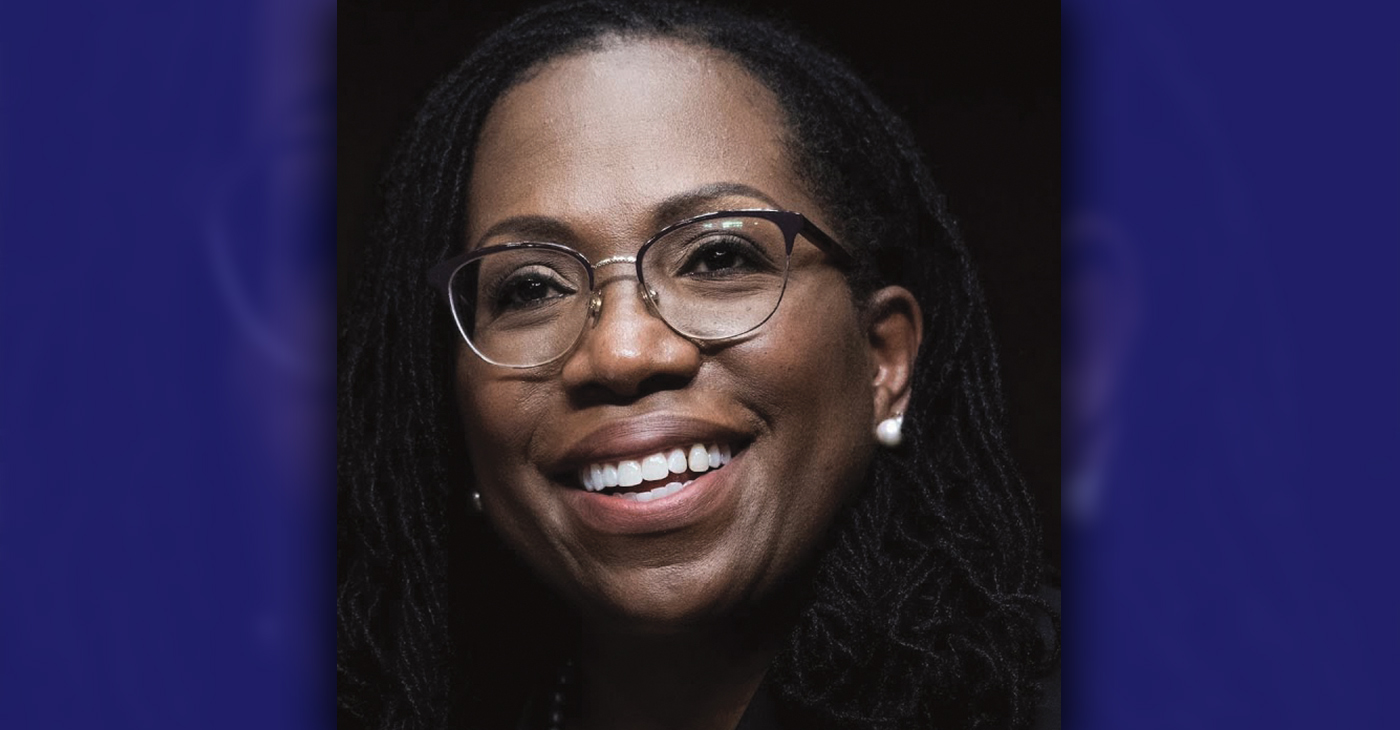Black History
Confirmation Hearings Begin for First Black Woman Supreme Court Nominee
The first day of hearings featured opening statements from the 22 members of the Judiciary Committee and opening remarks from Jackson. Democratic Senator Corey Booker noted the historic nature of Jackson’s nomination. “This is a ‘Jackie Robinson’ moment for our nation,” he said during prepared remarks. “For generations, America has been blessed with extraordinary legal talent in people of all backgrounds, but for the first time in our history an extraordinarily talented Black woman will serve on the Supreme Court. I’m profoundly moved by this. My heart aches with joy.”

By Brandon Patterson
Confirmation hearings began last Tuesday in the Senate Judiciary Committee for Biden Supreme Court nominee Ketanji Brown Jackson. The hearings marked the fourth time that Jackson had come before the Judiciary Committee for confirmation, having done so three times previously when nominated for lower judiciary positions.
Jackson, 52, currently serves as a federal judge in Washington, D.C. She will be the first Black woman ever to sit on the Supreme Court upon confirmation.
The first day of hearings featured opening statements from the 22 members of the Judiciary Committee and opening remarks from Jackson. Democratic Senator Corey Booker noted the historic nature of Jackson’s nomination. “This is a ‘Jackie Robinson’ moment for our nation,” he said during prepared remarks. “For generations, America has been blessed with extraordinary legal talent in people of all backgrounds, but for the first time in our history an extraordinarily talented Black woman will serve on the Supreme Court. I’m profoundly moved by this. My heart aches with joy.”
Jackson was introduced by Thomas Griffith, a former conservative appeals judge, a decision likely made to underscore her willingness to be “impartial” in her decision-making, a theme which Jackson returned to throughout the hearings. In her opening remarks, she honored the role her family and mentors have played in supporting her judicial career. She also thanked Justice Stephen Breyer, whom she is nominated to replace, and whom she clerked for early in her career after law school.
Yet the first two days of the hearings were marked more by political theater than by serious questions about decisions Jackson made as a judge, or how she might rule in certain cases.
In one instance, Republican Senator Ted Cruz asked Jackson about the New York Times’ 1619 Project and her views on critical race theory.
“It doesn’t come up in my work as a judge. It’s never something that I’ve studied or relied on,” Jackson replied. “And it wouldn’t be something that I would rely on if I was on the Supreme Court.” Cruz later held up a copy of a book called “Antiracist Baby” and asked Jackson whether she believes that “babies are racist.” Jackson said she did not.
Jackson was also asked whether she supported expanding the Supreme Court beyond nine justices. She declined to say, citing then-Supreme Court nominee Amy Coney Barrett, who, during her confirmation hearing in October 2020, declined to answer the same question. “I agree with Justice Barrett in her response to that question when she was asked before this committee,” Jackson said. “Judges should not be speaking into political issues.”
Yet other questions shed meaningful light on Jackson’s approach to the law. In response to one question, Jackson said she was “reluctant” to use labels such as “originalism” to characterize her judicial philosophy, saying that the Constitution is “fixed in its meaning” but that sometimes, judges also need to look at history and context to make decisions.
A recent Gallup poll found that 58% of Americans support Jackson’s nomination to the Supreme Court. Jackson’s confirmation hearings continued throughout the week.
Sources: NBC News, Gallup News, office of New Jersey Senator Corey Booker.
Activism
Oakland Post: Week of April 17 – 23, 2024
The printed Weekly Edition of the Oakland Post: Week of April 17 – 23, 2024

To enlarge your view of this issue, use the slider, magnifying glass icon or full page icon in the lower right corner of the browser window. ![]()
Black History
Matthew Henson: Explorer Extraordinaire
Matthew Henson, a trailblazing explorer who overcame countless obstacles to leave an incredible mark on history. Born on August 8, 1866, in Charles County, Maryland, his journey is a testament to the power of determination and the spirit of adventure.

By Tamara Shiloh
Matthew Henson, a trailblazing explorer who overcame countless obstacles to leave an incredible mark on history. Born on August 8, 1866, in Charles County, Maryland, his journey is a testament to the power of determination and the spirit of adventure.
Henson’s life began amidst the backdrop of post-Civil War America, where opportunities for African Americans were scarce. From a young age, he possessed an insatiable curiosity about the world beyond his small town. At the age of 12, he embarked on a journey that would change the course of his life forever when he joined a merchant ship as a cabin boy.
His most famous expedition was his journey to the Arctic with renowned explorer Robert E. Peary. In 1887, Henson joined Peary’s crew as a seaman and quickly proved himself to be invaluable with his skills as a navigator and craftsman. Over the course of several expeditions, Matthew endured extreme cold, treacherous terrain, and grueling conditions as he and Peary sought to reach the elusive North Pole.
In 1908–09, Peary set out on his eighth attempt to reach the North Pole. It was a big expedition, with Peary planning to leave supplies along the way. When he and Henson boarded their ship, the Roosevelt, leaving Greenland on August 18, 1909, they were joined by a large group. This included 22 Inuit men, 17 Inuit women, 10 children, 246 dogs, 70 tons of whale meat, blubber from 50 walruses, hunting gear, and tons of coal.
In February, Henson and Peary left their anchored ship at Ellesmere Island’s Cape Sheridan, along with the Inuit men and 130 dogs. They worked together to set up a trail and supplies along the way to the Pole.
Peary picked Henson and four Inuit people to join him in the final push to the Pole. However, before they reached their destination, Peary couldn’t walk anymore and had to ride in a dog sled. He sent Henson ahead to scout the way. In a later interview with a newspaper, Henson recalled being in the lead and realizing they had gone too far. The group turned back, and Henson noticed his footprints helped guide them to their destination. At that location, Henson planted the American flag.
Henson’s legacy extends far beyond his expeditions to the Arctic. He shattered racial barriers in the world of exploration and inspired countless individuals, regardless of race, to dream big and pursue their passions. In 1937, he was finally recognized for his achievements when he was inducted into The Explorers Club, an organization dedicated to promoting scientific exploration and field research.
Matthew Henson died in the Bronx, New York, on March 9, 1955, at the age of 88.
Art
Marin County: A Snapshot of California’s Black History Is on Display
The Marin County Office of Education, located at 1111 Las Gallinas Ave in San Rafael, will host the extraordinary exhibit, “The Legacy of Marin City: A California Black History Story (1942-1960),” from Feb. 1 to May 31, 2024. The interactive, historical, and immersive exhibit featuring memorabilia from Black shipyard workers who migrated from the South to the West Coast to work at the Marinship shipyard will provide an enriching experience for students and school staff. Community organizations will also be invited to tour the exhibit.

By Post Staff
The Marin County Office of Education, located at 1111 Las Gallinas Ave in San Rafael, will host the extraordinary exhibit, “The Legacy of Marin City: A California Black History Story (1942-1960),” from Feb. 1 to May 31, 2024.
The interactive, historical, and immersive exhibit featuring memorabilia from Black shipyard workers who migrated from the South to the West Coast to work at the Marinship shipyard will provide an enriching experience for students and school staff. Community organizations will also be invited to tour the exhibit.
All will have the opportunity to visit and be guided by its curator Felecia Gaston.
The exhibit will include photographs, articles and artifacts about the Black experience in Marin City from 1942 to 1960 from the Felecia Gaston Collection, the Anne T. Kent California Room Collection, The Ruth Marion and Pirkle Jones Collection, The Bancroft Library, and the Daniel Ruark Collection.
It also features contemporary original artwork by Chuck D of the Rock and Roll Hall of Fame group Public Enemy, clay sculptures by San Francisco-based artist Kaytea Petro, and art pieces made by Marin City youth in collaboration with Lynn Sondag, Associate Professor of Art at Dominican University of California.
The exhibit explores how Marin City residents endured housing inequities over the years and captures the history of plans to remove Black residents from the area after World War II. Throughout, it embodies the spirit of survival and endurance that emboldened the people who made Marin City home.
Felecia Gaston is the author of the commemorative book, ‘A Brand New Start…This is Home: The Story of World War II Marinship and the Legacy of Marin City.’ Thanks to the generous contribution of benefactors, a set of Felecia’s book will be placed in every public elementary, middle, and high school library in Marin.
In addition, educators and librarians at each school will have the opportunity to engage with Felecia in a review of best practices for utilizing the valuable primary sources within the book.
“Our goal is to provide students with the opportunity to learn from these significant and historical contributions to Marin County, California, and the United States,” said John Carroll, Marin County Superintendent of Schools.
“By engaging with Felecia’s book and then visiting the exhibit, students will be able to further connect their knowledge and gain a deeper understanding of this significant historical period,” Carroll continued.
Felecia Gaston adds, “The Marin County Office of Education’s decision to bring the Marin City Historical Traveling Exhibit and publication, ‘A Brand New Start…This is Home’ to young students is intentional and plays a substantial role in the educational world. It is imperative that our community knows the contributions of Marin City Black residents to Marin County. Our youth are best placed to lead this transformation.”
The Marin County Office of Education will host an Open House Reception of the exhibit’s debut on Feb. 1 from 4 p.m. – 6 p.m.. All school staff, educators, librarians, and community members are encouraged to attend to preview the exhibit and connect with Felecia Gaston. To contact Gaston, email MarinCityLegacy@marinschools.org
-

 Activism4 weeks ago
Activism4 weeks agoOakland Post: Week of March 27 – April 2, 2024
-

 #NNPA BlackPress4 weeks ago
#NNPA BlackPress4 weeks agoCOMMENTARY: D.C. Crime Bill Fails to Address Root Causes of Violence and Incarceration
-

 #NNPA BlackPress4 weeks ago
#NNPA BlackPress4 weeks agoFrom Raids to Revelations: The Dark Turn in Sean ‘Diddy’ Combs’ Saga
-

 #NNPA BlackPress4 weeks ago
#NNPA BlackPress4 weeks agoCOMMENTARY: Lady Day and The Lights!
-

 #NNPA BlackPress4 weeks ago
#NNPA BlackPress4 weeks agoMayor, City Council President React to May 31 Closing of Birmingham-Southern College
-

 #NNPA BlackPress4 weeks ago
#NNPA BlackPress4 weeks agoBaltimore Key Bridge Catastrophe: A City’s Heartbreak and a Nation’s Alarm
-

 #NNPA BlackPress4 weeks ago
#NNPA BlackPress4 weeks agoBaltimore’s Key Bridge Struck by Ship, Collapses into Water
-

 #NNPA BlackPress4 weeks ago
#NNPA BlackPress4 weeks agoBeloved Actor and Activist Louis Cameron Gossett Jr. Dies at 87


















































